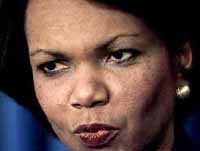Quartet of Mideast peacemakers gathers after inconclusive Israeli-Palestinian summit
U.S. Secretary of State Condoleezza Rice underlined international demands that any Palestinian government recognize Israel and renounce violence as she prepared for a meeting Wednesday of the Quartet of Middle East peace negotiators.

The meeting's host, German Foreign Minister Frank-Walter Steinmeier, cautioned against building unrealistic expectations for the U.S.-backed push for peace.
The Quartet the European Union, the U.S., the U.N. and Russia was convening for the second time this month in search of a way to advance stalled peace efforts amid strong misgivings about the Palestinians' planned unity government.
"All involved are well aware that this is and remains a difficult process," Steinmeier said after meeting with Rice. "We have to show a great deal of realism as far as expectations are concerned."
Rice held a three-way summit on Monday with Israeli Prime Minister Ehud Olmert and Palestinian President Mahmoud Abbas, which concluded with no new agreements and a pledge to keep talking.
On Tuesday, Israel ruled out any talks on a final peace deal with Abbas if he goes ahead with plans drawn up in Mecca, Saudi Arabia for his moderate Fatah faction to join the Islamic militant Hamas in a new government.
The international community has demanded that any Palestinian government recognize Israel, accept previous peace agreements and renounce violence as a condition for restoring vital foreign aid. Hamas has rejected the conditions, and the unity government accord tries to finesse those points.
"Those are not principles that are put there to be an obstacle they are put there because they're foundational for peace," Rice said.
"It's very difficult to imagine a circumstance in which you have peace talks but one party doesn't recognize the existence of the other or the right of the other to exist," Rice added. "It's very difficult to imagine that peace is going to be promoted if there is not a renunciation of violence, and that's why the Quartet principles are what they are."
The Quartet meeting brings Rice together with U.N. Secretary-General Ban Ki-moon, Russian Foreign Minister Sergey Lavrov, Steinmeier, EU foreign policy chief Javier Solana and the bloc's external relations commissioner, Benita Ferrero-Waldner.
While they were expected to discuss the implications of the Palestinian power-sharing agreement and Monday's three-way summit, Rice said no hasty decisions should be expected.
"We've said, all of us, that we will await the formation of the new (Palestinian) government before making any decisions about what to do, because we don't want to make premature decisions," she said.
Rice added that, in her talks in Jerusalem on Monday, "I emphasized the importance of continuing to press ahead with Mahmoud Abbas."
After an earlier meeting with Steinmeier, Ban said "what we need to do is to encourage the parties concerned."
"All this process may be very sensitive and may be very difficult," Ban told reporters. "However, at this time, it would be crucially important for (the) international community to encourage this Mecca deal and these ongoing diplomatic initiatives in the Middle East."
Germany, which holds the EU presidency, has pushed hard for the Quartet to take a key role in encouraging a revival of the peace process. The Quartet held a session in Washington on Feb. 2, reports AP.
"It is clear how important it is in such a situation that the international community speak with one voice," Steinmeier said.
European diplomats, like some U.S. allies in the Arab world, have also been pressing for a more muscular U.S. role in bringing peace between Israel and the Palestinians. Steinmeier praised Rice for her recent efforts in the region.
Subscribe to Pravda.Ru Telegram channel, Facebook, RSS!




